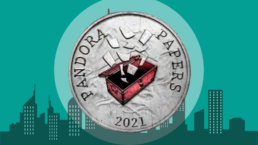By Emilia Díaz-Struck, Delphine Reuter, Agustin Armendariz, Jelena Cosic, Jesús Escudero, Miguel Fiandor Gutiérrez, Mago Torres, Karrie Kehoe, Margot Williams, Denise Hassanzade Ajiri and Sean McGoey, ICIJ
[We’re amplifying this story even though it lacks an appropriate punchline – so far. For context, decades of austerity and punishment of everyday people and even entire countries was justified on the grounds that ‘you just can’t tax too much’. Meanwhile, our presidents, kings, prime ministers and corporate masters have been hiding their assets in offshore accounts, to the tune of more than $11 trillion, as of 2020.
This hidden wealth is served by an entire political and legal infrastructure designed to help those with the most avoid paying taxes that might help those with the least. Given the size of this leak, expect names to be named, reputations to be shredded, and governments to fall. — Progressive Hub]
A 2.94 terabyte data trove exposes the offshore secrets of wealthy elites from more than 200 countries and territories. These are people who use tax and secrecy havens to buy property and hide assets; many avoid taxes and worse. They include more than 330 politicians and 130 Forbes billionaires, as well as celebrities, fraudsters, drug dealers, royal family members and leaders of religious groups around the world.
The International Consortium of Investigative Journalists spent more than a year structuring, researching and analyzing the more than 11.9 million records in the Pandora Papers leak. The task involved three main elements: journalists, technology and time.
What is the Pandora Papers?
The Pandora Papers investigation is the world’s largest-ever journalistic collaboration, involving more than 600 journalists from 150 media outlets in 117 countries.
The investigation is based on a leak of confidential records of 14 offshore service providers that give professional services to wealthy individuals and corporations seeking to incorporate shell companies, trusts, foundations and other entities in low- or no-tax jurisdictions. The entities enable owners to conceal their identities from the public and sometimes from regulators. Often, the providers help them open bank accounts in countries with light financial regulation.
The 2.94 terabytes of data, leaked to ICIJ and shared with media partners around the world, arrived in various formats: as documents, images, emails, spreadsheets, and more.
The records include an unprecedented amount of information on so-called beneficial owners of entities registered in the British Virgin Islands, Seychelles, Hong Kong, Belize, Panama, South Dakota and other secrecy jurisdictions. They also contain information on the shareholders, directors and officers. In addition to the rich, the famous and the infamous, those exposed by the leak include people who don’t represent a public interest and who don’t appear in our reporting, such as small business owners, doctors and other, usually affluent, individuals away from the public spotlight.
While some of the files date to the 1970s, most of those reviewed by ICIJ were created between 1996 and 2020. They cover a wide range of matters: the creation of shell companies, foundations and trusts; the use of such entities to purchase real estate, yachts, jets and life insurance; their use to make investments and to move money between bank accounts; estate planning and other inheritance issues; and the avoidance of taxes through complex financial schemes. Some documents are tied to financial crimes, including money laundering.

Recent Posts
‘Unconstitutional. Unethical. Authoritarian.’ ICE Bars Millions Of Immigrants From Bond Hearings
July 18, 2025
Take Action Now One watchdog said the new policy “seems like a blatant attempt to stop them from exercising their right to due process.”……
Americans Are Not Nearly Alarmed Enough About Climate Change
July 18, 2025
Take Action Now Americans still don’t comprehend how imminent, dangerous, and far-reaching the threat is—and journalists are partly to blame.By…
The IRS Is Building A Vast System To Share Millions Of Taxpayers’ Data With ICE
July 17, 2025
Take Action Now ProPublica has obtained the blueprint for the Trump administration’s unprecedented plan to turn over IRS records to Homeland Security…
Israel’s Sudden Assault On Syria Is Unchecked Aggression
July 17, 2025
Take Action Now Jerusalem is bombing Damascus and threatening al-Sharaa’s rule, while Washington was hoping to help the nascent government on…




